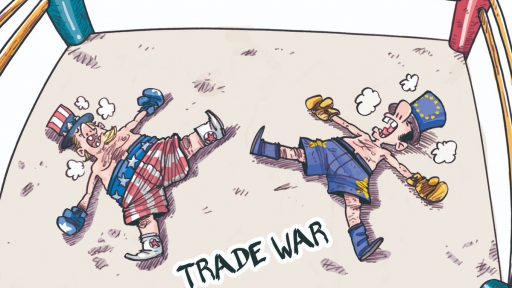- Home
- >
- Fundamental Analysis
- >
- The next round of tit-for-tat is where things could start to bite

The next round of tit-for-tat is where things could start to bite

The world economy is in relatively good shape, currently growing at almost 4 percent, a level not seen since before the 2008 financial crisis. But as policymakers have been warning, there are dark clouds looming on the horizon.
Last week, the Donald Trump administration upped the ante, announcing that it was considering imposing another round of tariffs on Chinese imports. This was followed by a tweet from the U.S. president suggesting that his administration is contemplating a 20 percent tariff on European cars — unless the European Union backs away from the circa $3 billion in retaliatory tariffs that it introduced on the U.S.
So far, economists have pointed out that the absolute level of tariffs as a percentage of global trade is quite small, with the impact ranging from 0.1 to 0.3 percent of gross domestic product (GDP) at most, and around a 0.1 to 0.2 percent impact on domestic inflation.
However, the next round of tit-for-tat is where things could start to bite.
Take autos, for example. Evercore analysts have warned that “a 25 percent import tariff on auto imports would pretty much destroy the business of importing cars from Europe/China to the U.S.” The financial cost of these tariffs could total 4.5 billion euros for German automakers (about 10 percent of total earnings) and as much as $400 million for U.S. automakers.
German automakers dropped more than 10 percent last week, while the DAX declined by almost 4 percent. Chinese markets also witnessed their worst week in months, on fears of a second round of tariffs that could target consumer goods exports far more than the first round did. Forward-looking indicators such as new orders are also starting to slow down, suggesting that many businesses may have front-loaded orders.
Political brinkmanship is making financial markets nervous and this is precisely the gamble that Trump is making.
It is no wonder then that German automakers are now engaged in talks with the U.S. ambassador to Germany to remove the 10 percent EU tax on American cars.
The question then becomes: how much repricing do we need to see in financial markets in order to put an end to the tit-for-tat retaliation? Things may have to get a lot worse before it becomes politically palatable to make concessions.
Source: CNBC
 Trader Georgi Bozhidarov
Trader Georgi Bozhidarov Read more:
If you think, we can improve that section,
please comment. Your oppinion is imortant for us.











